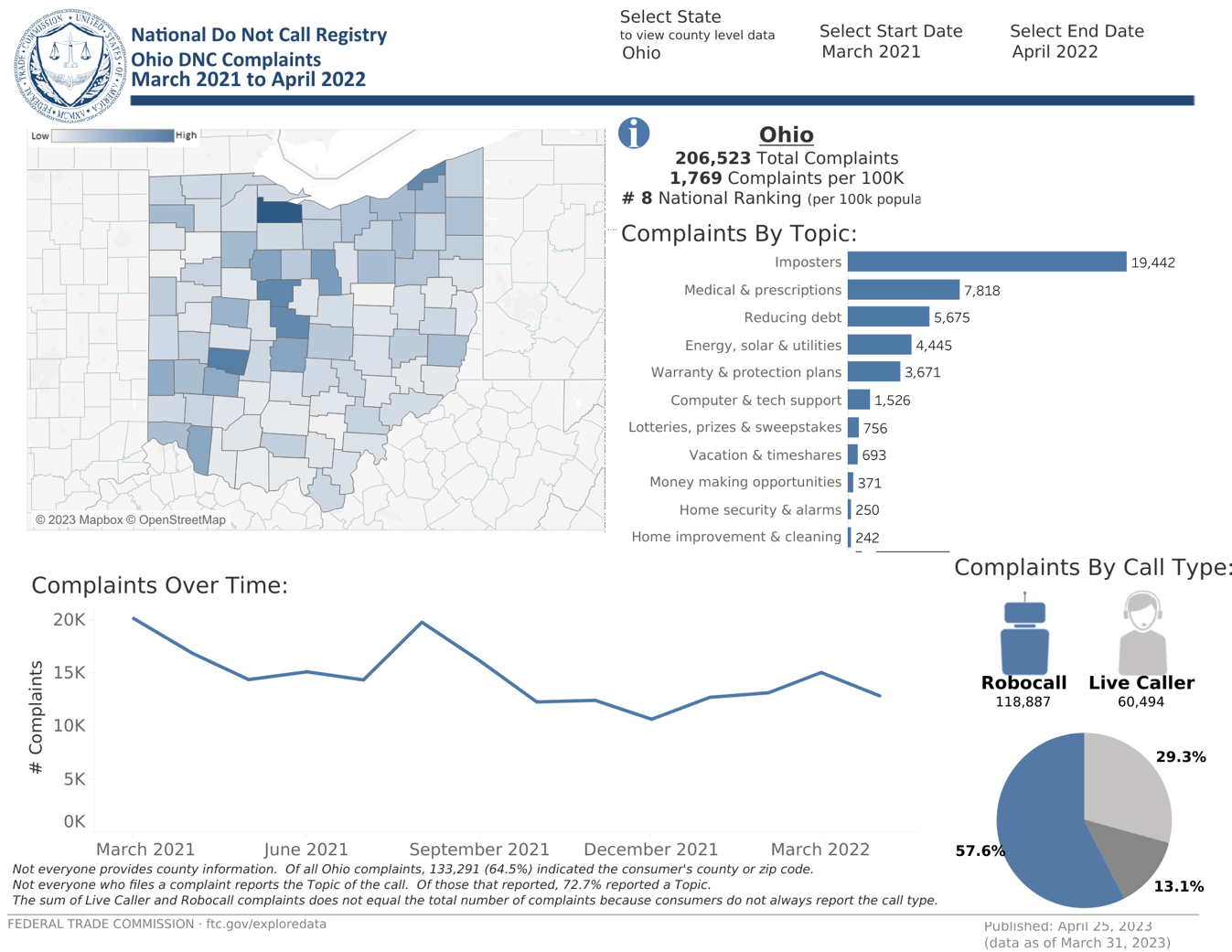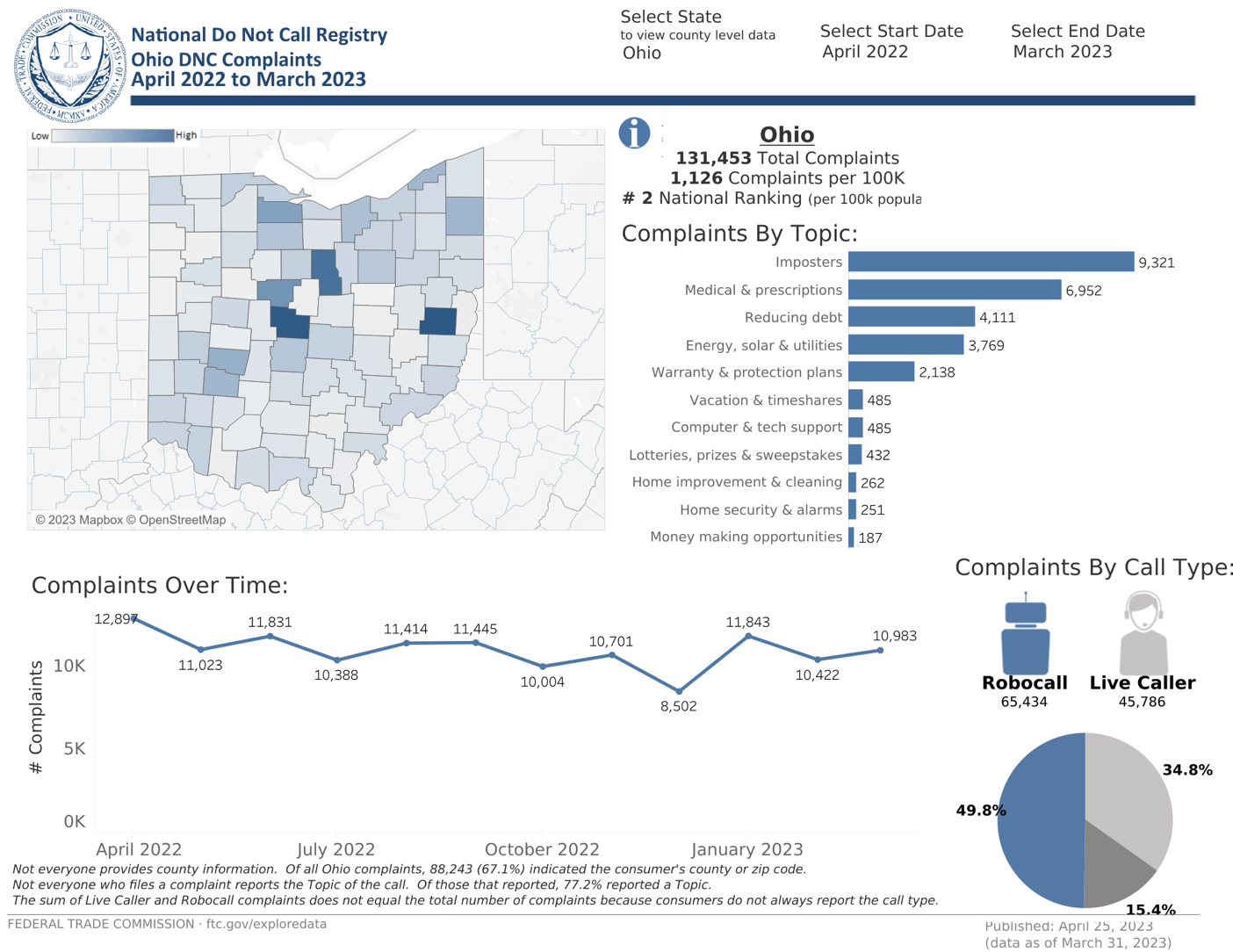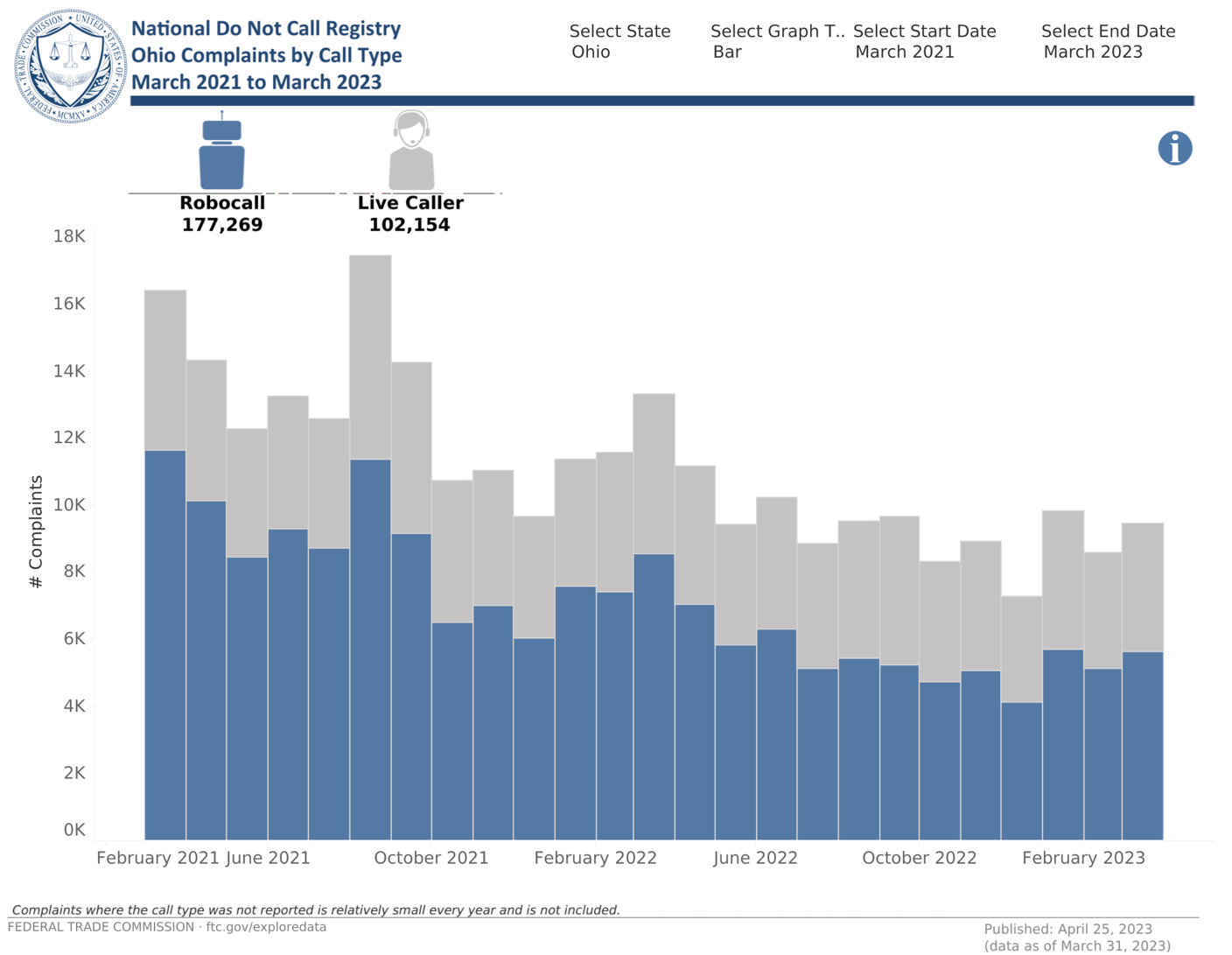Report Do Not Call Complaints




Report Do Not Call Complaints







Ohio ‘Do Not Call’ List
OHIO ‘Do Not Call’ List
Ohio does not have its own separate state Do Not Call list, and requires residents to register on the National Do Not Call list maintained by the Federal Trade Commission (“FTC”). The Ohio state legislature imposes various restrictions on telemarketers making solicitation calls to Ohio residents.
Ohio’s Telemarketing Laws
Telemarketers making calls to residents in Ohio must comply with Ohio’s Telephone Solicitation Sales Act, Chapter 4719 of the Ohio Revised Code, the Federal Trade Commission’s Telemarketing Sales Rule, and the Telephone Consumer Protection Act of 1991. These laws regulate what telemarketers can say and do, and give consumers certain rights and protections.
Some of the main requirements and restrictions for telemarketers calling Ohio phone numbers are:
• They must not block the disclosure of their phone number on caller ID.
• They must state their real name, company name, purpose of the call, and goods or services being sold within the first 60 seconds of the call.
• They must provide certain information before requesting payment, such as the total cost, refund policy, and consumer rights.
• They must obtain a signed written contract or provide a notice of cancellation before accepting payment.
• They must notify the Attorney General if they intend to offer prizes.
• They must not call consumers who are on the National Do Not Call Registry.
• They must not call consumers before 8 am or after 9 pm local time.
• They must not use false, fraudulent, deceptive, or misleading information.
• They must not harass, coerce, intimidate, or threaten consumers.
• They must not misrepresent their affiliation or endorsement by any third party.
Consumers may report telemarketing calls to Ohio Attorney General
The Ohio state legislature does not provide a private right of action to the consumers for suing telemarketers who call in violation of the law. However even Ohio consumers may consult with a consumer rights attorney to investigate their claims under the federal laws.
Consumers have been filing individual and class actions against violating telemarketers under the TCPA, to stop the unwanted telemarketing calls and to also recover statutory damages. In hundreds of TCPA lawsuits, consumers have recovered between $500 and $1500 for each time a telemarketer called them in violation of the law.
Alternatively, if you are an Ohio resident and received calls which you feel violated any the above rules, you can make a complaint to the Ohio Attorney General’s office. You may register your complaint with the Ohio Attorney General’s office by:
- Calling their phone number: 1-800-282-0515.
- Filling out this form on this website: https://www.ohioprotects.org/robo
- You can report calls received on either landline, or cell phone.
- You can report text messages, live/in person phone calls, and robocalls.
- You need to fill out your phone number, and the details of the caller.
- Describe the nature of the call you are reporting by selecting from the following options. The call you received was:
- To get money from you,
- To get your personal information,
- To recover money you owed,
- To sell you something,
- For political awareness,
- To conduct a survey,
- To threaten arrest,
- To have you call them back,
- On behalf of a charitable or religious institution, and/or
- Unknown.

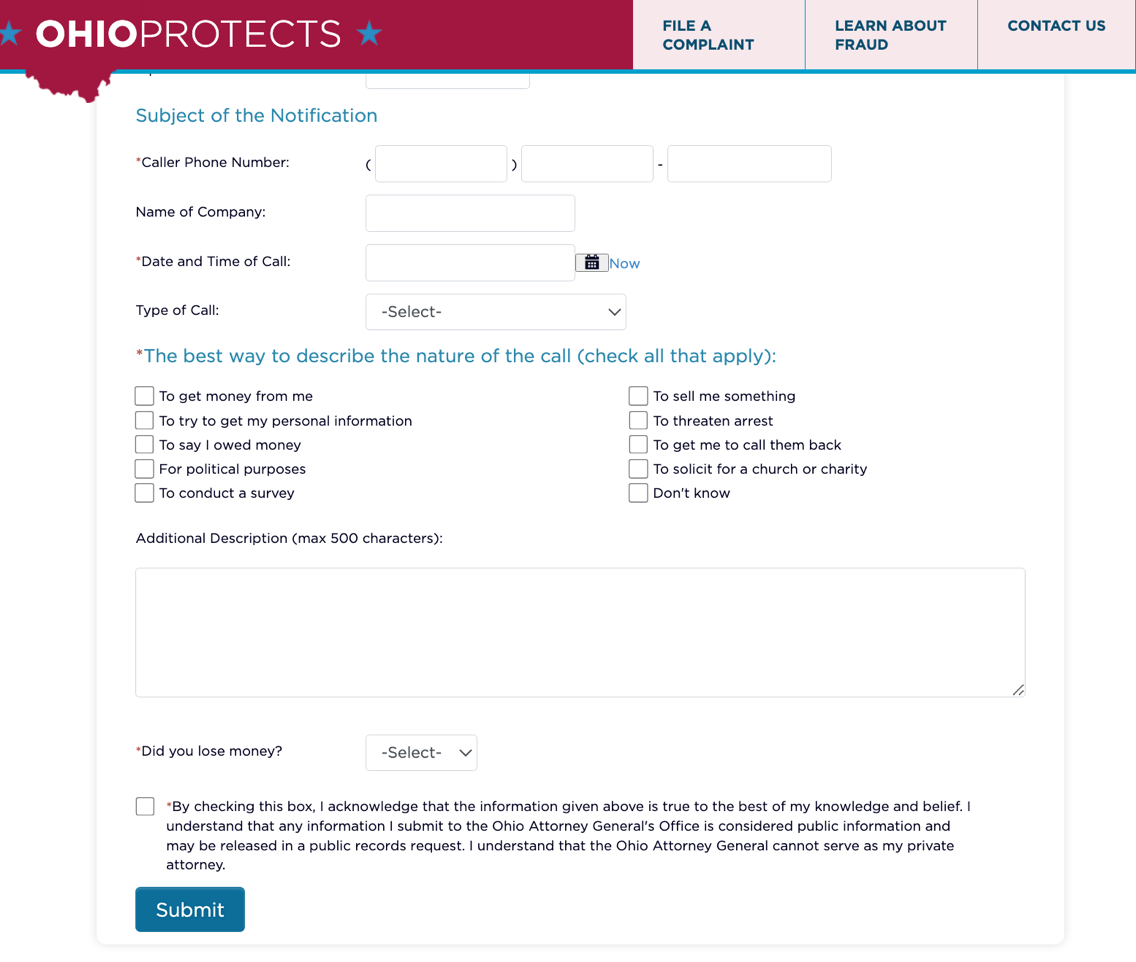
Or you can also file a complaint with the Federal Trade Commission at www.ftc.gov or 1-877-382-4357 or 1-877-FTC-HELP.
How can an Ohio consumer register their phone number on the Do Not Call List?
FTC maintains the National Do Not Call List. Telemarketers are required to make sure that they do not call the phone numbers on the National Do Not Call list, unless they have that consumer’s written consent to call their phone or they received an inquiry from the consumer, while also allowing or inviting the telemarketer to call at the consumers phone number.
Registering your phone number to the National Do Not Call list is an easy process and can be done in any one of several ways.
- You can just call this toll-free number: 1-888-382-1222.
- You may register by filling out this form on the National DNC website:
https://www.donotcall.gov/register.html#step1- You can register up to 3 phone numbers at once.
- You need to provide confirmation via email for completing the registration.
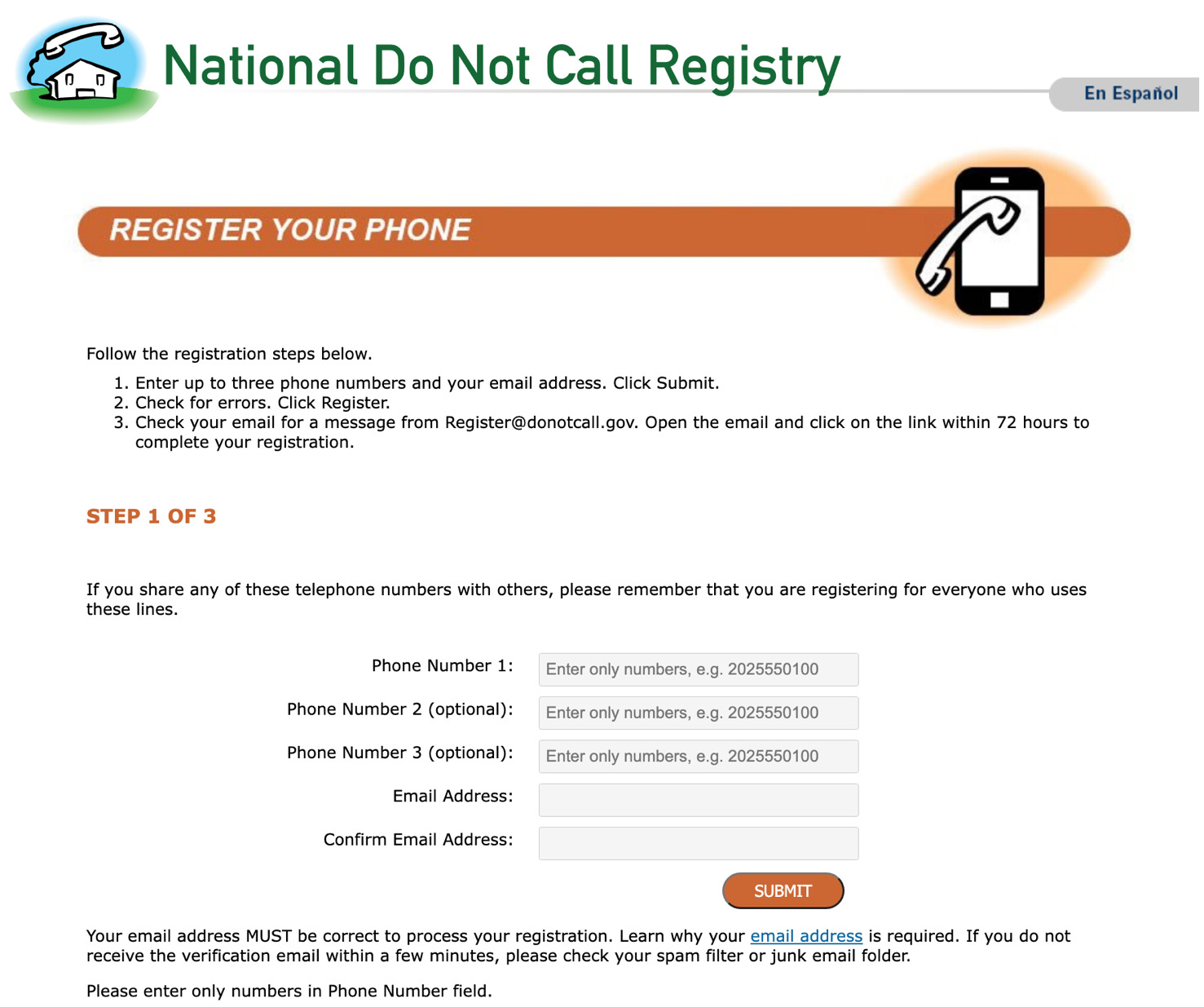
Once you complete the registration process, your phone number should be added to the National Do Not Call list within a day. It remains on the list until you remove it. No matter how long ago you registered your phone number on the Do Not Call (DNC) list, it should still be on it. To confirm your DNC registration, you can visit this link: https://www.donotcall.gov/verify.html.
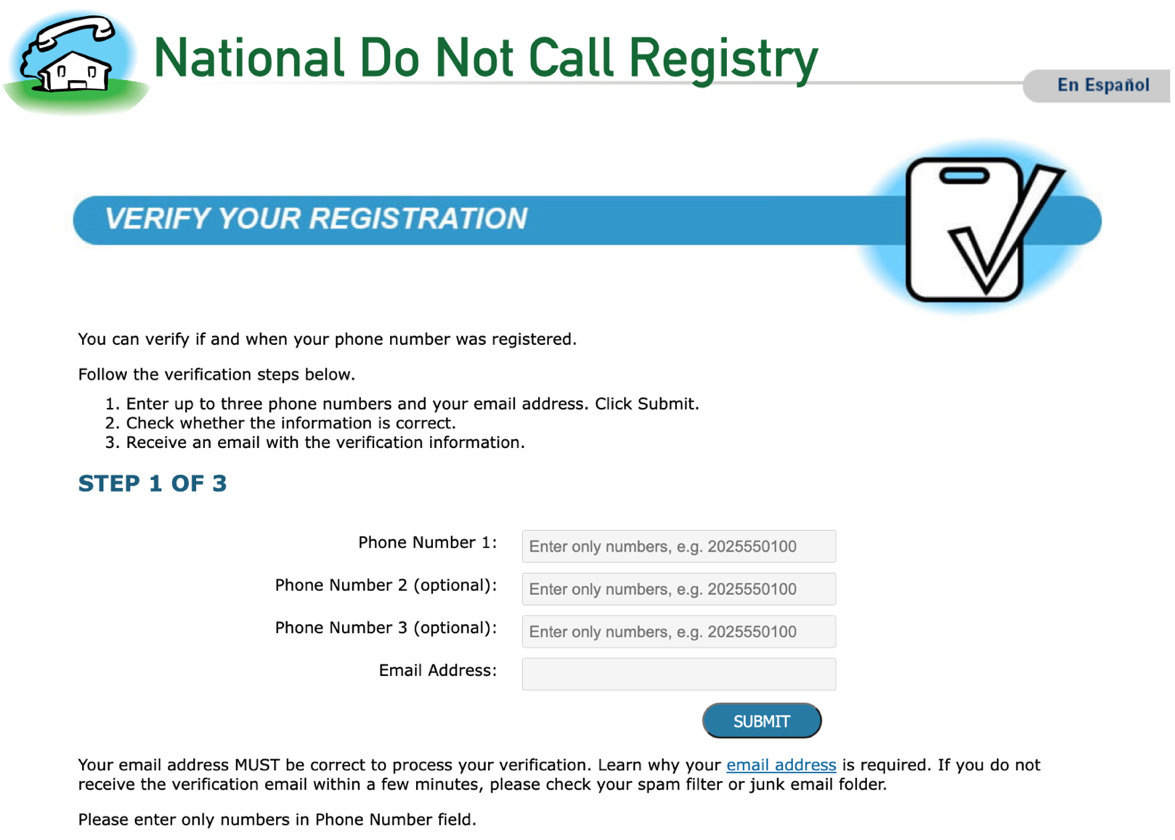
Telemarketers have 30 days to notice your number on the DNC list. Typically, after 31 days of registering, you should not receive any calls from unknown telemarketers.
If you still receive unwanted calls after a month, note the details and report them to the appropriate authority. You can report to government agencies like the FTC, FCC, or your state’s AG. Alternatively, you can consult a consumer rights attorney to investigate the calls and explore legal remedies available under state and federal laws. Usually, you don’t have to pay to investigate your claims, or even file a class action claim under the TCPA.
The TCPA Offers Protection to Ohio Consumers In Addition to their state laws.
Ohio consumers are protected by both state laws and the federal Telephone Consumer Protection Act (TCPA). The TCPA is a US federal law that safeguards consumer privacy by providing protection against unsolicited telemarketing calls. Here are some key features of the TCPA:
1. No Automated Calls: Telemarketers cannot use automated or prerecorded voice messages (robocalls) to call at consumers landline or cell phones without their prior consent.
2. National Do Not Call Registry: The TCPA established the National Do Not Call Registry, allowing consumers to opt out of telemarketing calls. Telemarketers generally cannot call numbers on the registry, with certain limited exemptions.
3. Consent Requirements: Telemarketers must obtain the consumer’s express consent before making automated calls or sending prerecorded messages for marketing purposes. Written consent is usually required for calls using an artificial or prerecorded voice.
4. Caller Identification: Telemarketers must display accurate caller identification information, including their name and phone number.
5. Opt-Out Mechanism: Telemarketers must provide an easy way for consumers to opt out of future telemarketing calls, often through an automated opt-out mechanism during the call. If telemarketers continue to call after a consumer has made clear stop requests, such calls may be in violation of this law.
6. Enforcement and Remedies: Government agencies like the FCC also enforce TCPA regulations and impose penalties. Or consumers can take legal action against TCPA violators, seeking damages for any actual losses or statutory damages. Telemarketers may have to pay $500 to $1,500 for each time they called a consumer in violation of the law.
To fully benefit from TCPA protections, consumers should know their rights, report violations promptly, and maintain documentation of non-compliant calls as evidence for potential legal actions.
Or to get telemarketers to stop calling you, and to accurately assess your remedies under the law, you should consult an experienced TCPA attorney to investigate for you.
Registering on the National Do Not Call (DNC) list helps reduce telemarketing calls, but it won’t stop all of them.
Some organizations are exempt from the Do Not Call rules, including political organizations and charities.
Exceptions to the Do Not Call rules include:
- calls from businesses you have an existing relationship with,
- calls made with your prior permission,
- calls related to non-profit organizations,
- non-commercial calls for surveys or political purposes,
- calls to business numbers,
- calls made by individuals on their own behalf, and
- calls to recover a debt you owe.
While the DNC list does provide significant protection against most telemarketing laws, it does not restrict the above calls. However, certain other restrictions still may apply even for these calls, like:
- they cannot call you outside of ordinary business hours,
- they should not intentionally hide or falsify the caller ID information on their calls,
- they can only use a prerecorded voice message if they have the consumer’s express consent to receive such calls, and
- to maintain an internal do not call list, and to stop calling consumers who have requested so.
Beware of the Emergency Payment Scam reported in Ohio.
What is the scam? Scammers call consumers, pretending to be affiliated with a utility company, and demand immediate payment of utility bills using a credit card or specific prepaid cards.
How do they scam you? The scammers use threats of utility service disconnection to coerce victims into making payments by credit card or specific prepaid cards available at convenience and drug stores. Consequently, the scammer gains access to the victim’s credit card information, or the victim is left with a prepaid card that the utility may not accept.
How can you avoid getting scammed? Stay vigilant and be cautious when receiving such calls, especially when pressured for immediate payments. Utility companies typically have specific procedures for bill payments, and it’s important to verify any payment requests by contacting the utility company directly using their official contact information.
AEP and CenterPoint Energy have warned their customers about this scam, advising them not to provide personal or financial information over the phone and emphasizing that they do not ask for payments in this manner. A similar scam involving FirstEnergy was also reported by the Cleveland Plain Dealer.
Report such calls to the FCC, or to your state’s Attorney General’s office.
Utilities Fraud may lead to identity theft.
Since 2014, Ohio has had a significant number of identity theft complaints related to government benefits, credit cards, and utilities fraud, ranking 20th in the nation for such complaints reported to the Federal Trade Commission (FTC).
How does they get your personal information? One prevalent form of utility fraud involves scammers posing as representatives from federal or state agencies offering grants to pay customers’ utility bills in full for one month. However, it’s important to note that there is currently no single government grant available to cover an entire monthly bill. The intention of the scam is to deceive unsuspecting consumers into divulging sensitive personal information that can be used for identity theft.
The FTC has observed that scammers frequently contact victims by phone, making it the primary communication method for this type of fraud.
How can you avoid it? The Ohio Consumers’ Counsel (OCC) provides fact sheets on their website about payment assistance programs available to low-income customers. It’s advisable to review this information and contact your local utility company to inquire about additional assistance options. Being informed about legitimate programs can help you identify fraudulent claims and protect your personal information.
Stay vigilant and exercise caution when receiving unsolicited calls or requests for personal information, especially related to utility payments.
There’s Even a Do Not Call List Scam.
How do they do it? Scammers deceive consumers by posing as representatives of a state Do Not Call registry. They request personal information under the pretence of enrolling or confirming enrolment on the registry, but instead, use that information to commit fraud.
What do they steal? Consumers receive a call claiming to enrol or verify their enrolment on the state’s Do Not Call registry. In order to establish identity, the caller requests sensitive information like Social Security numbers or bank account details. Unfortunately, this information is later misused for unauthorized purchases, identity theft, and other fraudulent activities.
How can you protect yourself? Be aware that Ohio does not have a separate state Do Not Call registry. Instead, Ohio utilizes the national registry to identify residents who wish to avoid telemarketing calls. It’s important to remember that officials operating the national registry do not call consumers to enrol or confirm enrolment. Additionally, individuals do not need to provide Social Security or bank account numbers to add their telephone numbers to the national Do Not Call registry.
Exercise caution when receiving calls related to the Do Not Call registry, especially if they request personal information. Never share sensitive details unless you can verify the legitimacy of the caller.
A quick look at unwanted calls reported to FTC from Ohio:
According to the annual report for FY 2022 by the FTC:
- By the end of FY 2022, Ohio residents had registered over 9.7 million phone numbers on the National Do Not Call list. Ranking 14th state with the highest number of registrations for every 100,000 residents.
- Ohio has been among the top few states for reporting unwanted calls to the FTC, with close to 145,000 reports in a year.
- Between March 2021 and April 2022, the FTC received 206,523 complaints from Ohio, averaging 1,769 complaints per 100,000 individuals.
- Robocalls or pre-recorded voice calls are the majority of the reported calls from Ohio. While almost a third of the complains were regarding calls by live callers.
- The most common types of calls reported by Ohio residents to the FTC were related to imposters, solar and energy utilities, medical and prescription plans, and debt reduction offers.
- The number of complaints FTC received from Ohio have been gradually declining. From around 16,000 complaints a month in February 2021, to less than 10,000 complaints in March 2023.
If you’re receiving bothersome telemarketing calls that potentially violate the law, consider the following options:
1. Consult with a Consumer Protection Attorney: Seek advice from a lawyer specializing in consumer protection laws. They can assess your situation, determine if any violations occurred, and guide you through the legal process. An attorney can help you pursue compensation or appropriate remedies for each call or text message that violates the TCPA. In certain cases, you may be eligible for damages ranging from $500 to $1,500 per violation. If other consumers have faced similar calls, you might have the option to file a class action complaint on their behalf.
2. File a Complaint with the FCC: The Federal Communications Commission (FCC) is responsible for enforcing the TCPA. You can submit a complaint through the FCC’s online Consumer Complaint Center at https://consumercomplaints.fcc.gov/ or contact them via phone or mail. Ensure you provide detailed information about the violations, including dates, times, caller details, and any supporting evidence you have.
3. File a Complaint with the FTC: The Federal Trade Commission (FTC) is another authority involved in TCPA enforcement. Utilize the FTC’s Complaint Assistant at https://www.ftccomplaintassistant.gov/ to file a complaint. Include comprehensive details about the violations and any supporting evidence you’ve collected to strengthen your case.
4. Report the calls to your State Attorney General’s office: The Ohio Attorney General is empowered to enforce the state as well as federal telemarketing laws. Consumers may report unwanted calls that they believe violate the laws to the Ohio Attorney General’s office at: https://www.ohioprotects.org/robo or by calling their office on 1-800-282-0515.
By promptly reporting such calls, you can:
– Raise awareness about TCPA violations.
– Help enforce regulations.
– Hold telemarketers accountable for their actions.
Make sure to keep detailed records of important information like dates, times, caller details, call logs, and communication records. These records are valuable evidence that supports your complaint and strengthens your case.
Conclusion:
Ohio residents can utilize the TCPA to address unwanted telemarketing calls and even seek compensation. However, navigating the complexities of the law can be difficult. It’s recommended to consult a legal expert who can provide personalized guidance, help you understand your rights, and determine the best course of action. With their expertise, you can effectively address privacy violations caused by unwanted telemarketing calls.
It’s important to understand that although the TCPA sets out statutory damages for each violation, the actual recovery of these damages is not guaranteed. The ability to collect such damages depends on the financial situation of the violator and their ability to satisfy the judgment. However, the TCPA still offers consumers substantial remedies to combat unwanted calls and establishes a legal framework for addressing privacy breaches. While the specific collection of damages may differ in each case, the TCPA remains a strong tool for holding telemarketers accountable and protecting consumer rights regarding unwanted calls.
-
https://www.ftc.gov/system/files/ftc_gov/pdf/DNC-Data-Book-2022.pdf ↑
-
https://public.tableau.com/app/profile/federal.trade.commission/viz/DoNotCallComplaints/Maps ↑
-
https://public.tableau.com/app/profile/federal.trade.commission/viz/DoNotCallComplaints/Maps ↑
-
https://www.ftc.gov/system/files/ftc_gov/pdf/DNC-Data-Book-2022.pdf ↑

